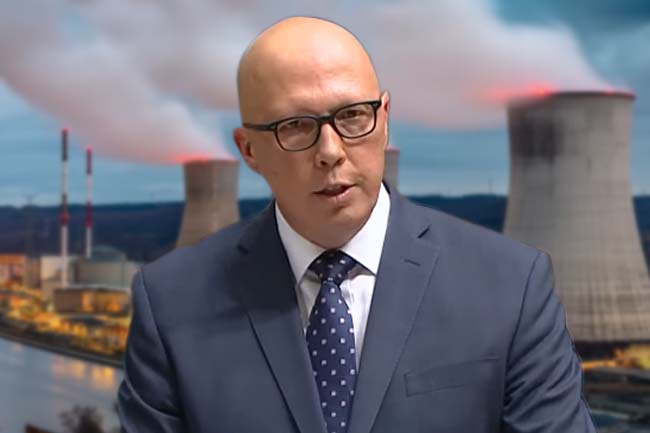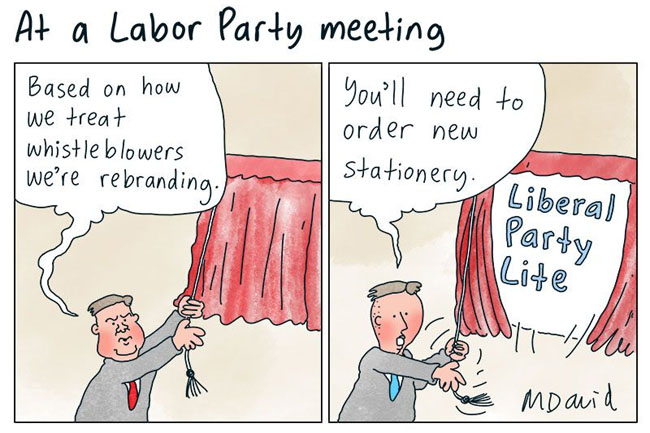Over decades, the Right wing has been on a steady intellectual decline, but the ideology still finds ways to retain control, writes Professor John Quiggin.
IT'S HARD TO REMEMBER NOW, but back in the 1990s, it seemed as if the Right had won all the important arguments. Books like Fukuyama’s ‘The End of History and the Last Man’ and Friedman’s ‘The Lexus and the Olive Tree’ proclaimed the message that (in Margaret Thatcher’s memorable words) “there is no alternative” to neoliberalism and financialised capitalism.
The parties of the centre-Left rushed to embrace a marginally softer version of neoliberalism. Globally, this shift was called the Third Way and associated with Tony Blair and Bill Clinton. The Australian Labor Party made this shift a decade earlier under Bob Hawke and Paul Keating. Beginning with financial deregulation in the early 1980s, Hawke and Keating adopted most of the neoliberal agenda of privatisation and smaller government, offset by relatively progressive social welfare policies.
The Right’s intellectual victories weren’t confined to economics and politics. In the “science wars” of the early 1990s, Right-wingers presented themselves as the defenders of science and reason against academic postmodernism and political correctness. Although many of the most incisive criticisms of these trends came from the Left, the general idea that the Right was on the side of science remained prevalent.
Twenty years later, everything has changed. The parties of the Right, here and overseas, have reduced their appeal to three-word slogans such as “stop the boats” and “build that wall”, based on fear and hate. Their leaders are clownish authoritarians like Donald Trump and Boris Johnson (or wannabes like Scott Morrison) who make obviously false claims based on “alternative facts”.
What has happened here? In economic terms, the widely shared prosperity of the 1990s has been replaced by slow growth and rising inequality, punctuated by the Global Financial Crisis.
But an equally important role has been played by Right-wing resistance to any attempt to mitigate climate change. This resistance was driven initially by the interests of big oil firms, most notably ExxonMobil. However, it relied from the start on culture war attacks on “enviros” and “greenies”.
Over time, as the evidence on climate change became irrefutable, big corporations mostly adjusted to the reality of the problem and the need to find alternatives to carbon-based energy. But the culture warriors only turned up the rhetoric, moving from semi-plausible scientific arguments to silly talking points and then to bizarre conspiracy theories. As I argued recently in an article for Jacobin, climate change denial played a crucial role in preparing the ground for Trumpism.
The loss of any intellectual credibility hasn’t stopped the Right from winning elections, albeit narrowly. After their surprise election victory in May, the Australian Right thought they could put the issue behind them. But the combination of drought, record-breaking temperatures and catastrophic fires has changed all that.
As long as climate change was a threat to the future, Right-wing culture warriors could produce a stream of mutually contradictory talking points, to push the claim that the whole thing was a fiction dreamed up by “warmists” and “alarmists”.
As the bushfire crisis emerged late last year, the talking points approach failed. The first try was the claim that these fires were no worse than others in the past. As the area burned by the fires and the number of homes destroyed continued to mount, this claim was quietly abandoned.
Next, it was claimed that the problem was inadequate control burning — blamed, as usual, on greenies. This was rapidly refuted by fire chiefs, who noted that the area subject to prescribed burning had doubled and that the main constraint was the declining number of days on which such burning could safely be undertaken.
After that, the fires were blamed on arsonists, although, of course, there has been no increase in the prevalence of such disturbed individuals. It soon became clear that the great majority of the damaging fires were caused by lightning and then self-sustaining.
At this point, the Murdoch media concluded that outright denialism was no longer tenable. In characteristic fashion, The Australian proceeded to deny its own record of denialism, a fact on which they were called out by none other than James Murdoch. Meanwhile, the old white men who make up the core of the Right-wing base aren’t intellectually nimble enough to make these adjustments. Even as houses burn around them and choking smoke fills the streets, they repost claims that “global warming stopped in 1998”.
The intellectual collapse of the Right doesn’t make them any less dangerous, rather the reverse. As neoliberalism has declined, it has been replaced by the combination of overt racism, reactionary nationalism and “big man” demagoguery that may be summed up as “Trumpism”. There is no point in attempting engagement with Trumpists. Our only hope is to peel off enough of the (small) group of moderate conservatives to form a durable majority.
Professor John Quiggin is an economist and Laureate Fellow at the University of Queensland. You can follow him on Twitter @johnquiggin.
 This work is licensed under a Creative Commons Attribution-NonCommercial-NoDerivs 3.0 Australia License
This work is licensed under a Creative Commons Attribution-NonCommercial-NoDerivs 3.0 Australia License
Support independent journalism Subscribe to IA.












